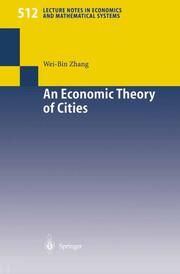Detailansicht
An Economic Theory of Cities
Spatial Models with Capital, Knowledge, and Structures, Lecture Notes in Economics and Mathematical Systems 512
ISBN/EAN: 9783540427674
Umbreit-Nr.: 1467057
Sprache:
Englisch
Umfang: xi, 228 S.
Format in cm:
Einband:
kartoniertes Buch
Erschienen am 20.11.2001
- Zusatztext
- Over more than two centuries the developmentofeconomic theory has created a wide array of different concepts, theories, and insights. My recent books, Capital and Knowledge (Zhang, 1999) and A TheoryofInternational Trade (Zhang, 2000) show how separate economic theories such as the Marxian economics, the Keynesian economics, the general equilibrium theory, the neoclassical growth theory, and the neoclassical trade theory can be examined within a single theoretical framework. This book isto further expand the frameworkproposed in the previous studies. This book is a part of my economic theory with endogenous population, capital, knowledge, preferences, sexual division of labor and consumption, institutions, economic structures and exchange values over time and space (Zhang, 1996a). As an extension of the Capital and Knowledge, which is focused on the dynamics of national economies, this book is to construct a theory of urban economies. We are concerned with dynamic relations between division of labor, division ofconsumption and determination of prices structure over space. We examine dynamic interdependence between capital accumulation, knowledge creation and utilization, economicgrowth, price structuresand urban pattern formation under free competition. The theory is constructed on the basisofa few concepts within a compact framework. The comparative advantage of our theory is that in providing rich insights into complex of spatial economies it uses only a few concepts and simplified functional forms and accepts a few assumptions about behavior of consumers, producers, and institutionalstructures.
- Kurztext
- This text is concerned with dynamic relations between urban division of labour, division of consumption and determination of price structure within a perfectly competitive framework in spatial economy.
